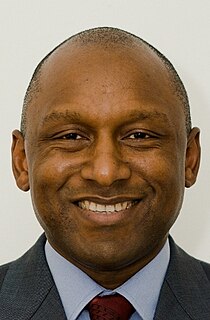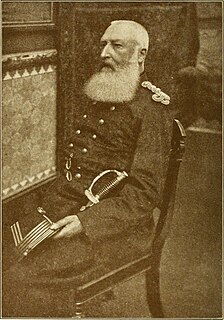
A dictator is a political leader who possesses absolute power. A dictatorship is a state ruled by one dictator or by a small clique. The word originated as the title of a Roman dictator elected by the Roman Senate to rule the republic in times of emergency.
Democide is a term coined by American political scientist Rudolph Rummel to describe "the intentional killing of an unarmed or disarmed person by government agents acting in their authoritative capacity and pursuant to government policy or high command." According to Rummel, this definition covers a wide range of deaths, including forced labor and concentration camp victims, killings by mercenaries and unofficial private groups, extrajudicial summary killings, and mass deaths due to governmental acts of criminal omission and neglect, such as in deliberate famines like the Holodomor, as well as killings by de facto governments, i.e. killings during a civil war. This definition covers any murder of any number of persons by any government.

The Cape Colony, also known as the Cape of Good Hope, was a British colony in present-day South Africa named after the Cape of Good Hope. The British colony was preceded by an earlier corporate colony that became an original Dutch colony of the same name, which was established in 1652 by the Dutch East India Company (VOC). The Cape was under VOC rule from 1652 to 1795 and under rule of the Napoleonic Batavia Republic from 1803 to 1806.

A famine is a widespread scarcity of food, caused by several factors including war, natural disasters, crop failure, population imbalance, widespread poverty, an economic catastrophe or government policies. This phenomenon is usually accompanied or followed by regional malnutrition, starvation, epidemic, and increased mortality. Every inhabited continent in the world has experienced a period of famine throughout history. In the 19th and 20th century, generally characterized Southeast and South Asia, as well as Eastern and Central Europe, in terms of having suffered most number of deaths from famine. The numbers dying from famine began to fall sharply from the 2000s. Since 2010, Africa has been the most affected continent in the world.
Timothy Patrick "Tim Pat" Coogan is an Irish writer, historian, broadcaster and newspaper columnist. He served as editor of The Irish Press newspaper from 1968-87. He has been best-known for such books as The IRA, Ireland Since the Rising, On the Blanket, and biographies of Michael Collins and Éamon de Valera. His biography of de Valera proved controversial, taking issue with the former Irish president's reputation and achievements, in favour of those of Collins, whom he regards as indispensable to the creation of the new State.

The Derg, officially the Provisional Military Administrative Council (PMAC), was the military junta that ruled Ethiopia and present-day Eritrea from 1974 to 1987, when the military leadership formally "civilianized" the administration but stayed in power until 1991.

Pan-Africanism is a worldwide movement that aims to encourage and strengthen bonds of solidarity between all indigenous and diaspora ethnic groups of African ancestry. Based on a common goal dating back to the Atlantic Slave Trade, the movement extends beyond continental Africans with a substantial support base among the African diaspora in the Americas and Europe.

The Black Book of Communism: Crimes, Terror, Repression is a 1997 book by Stéphane Courtois, Andrzej Paczkowski, Nicolas Werth, Jean-Louis Margolin, and several other European academics documenting a history of political repression by Communist states, including genocides, extrajudicial executions, deportations, and deaths in labor camps and artificially created famines. The book was originally published in France as Le Livre noir du communisme: Crimes, terreur, répression by Éditions Robert Laffont. In the United States, it was published by Harvard University Press, with a foreword by Martin Malia. The German edition, published by Piper Verlag, includes a chapter written by Joachim Gauck. The introduction was written by Courtois. Historian François Furet was originally slated to write the introduction, but he died before being able to do so.

Africa is the world's second-largest and second-most populous continent, after Asia in both cases. At about 30.3 million km2 including adjacent islands, it covers 6% of Earth's total surface area and 20% of its land area. With 1.4 billion people as of 2021, it accounts for about 18% of the world's human population. Africa's population is the youngest amongst all the continents; the median age in 2012 was 19.7, when the worldwide median age was 30.4. Despite a wide range of natural resources, Africa is the least wealthy continent per capita and second-least wealthy by total wealth, behind Oceania. Scholars have attributed this to different factors including geography, climate, tribalism, colonialism, the Cold War, neocolonialism, lack of democracy, and corruption. Despite this low concentration of wealth, recent economic expansion and the large and young population make Africa an important economic market in the broader global context.
The actions by governments of communist states have been subject to criticism across the political spectrum. According to the critics, the rule by communist parties leads to totalitarianism, political repression, restrictions of human rights, poor economic performance and cultural and artistic censorship. Communist party rule has been especially criticized by anti-communists and right-wing critics, but also by other socialists such as anarchists, communists, democratic socialists, libertarian socialists and Marxists. Ruling communist parties have also been challenged by domestic dissent.

Communism is a far-left philosophical, social, political, and economic ideology and movement whose goal is the establishment of a communist society, namely a socioeconomic order based on the idea of common ownership of the means of production, distribution, and exchange—allocating products to everyone in the society. It can involve the absence of social classes, money, and the state. Communism, while sometimes used as a synonym of socialism, is mainly a specific, yet distinct, form of socialism. Communists often seek a voluntary state of self-governance, but disagree on the means to this end. This reflects a distinction between a more libertarian approach of communization, revolutionary spontaneity, and workers' self-management, and a more vanguardist or communist party-driven approach through the development of a constitutional socialist state followed by Friedrich Engels' withering away of the state.
Godfrey Mwakikagile is a prominent Tanzanian scholar and author specialising in African studies. He was also a news reporter for The Standard — the oldest and largest English newspaper in Tanzania and one of the three largest in East Africa.
The history of external colonisation of Africa can be dated back from ancient, medieval, or modern history, depending on how the term colonisation is defined.

The Republic of Dahomey, simply known as Dahomey, was established on 4 December 1958, as a self-governing colony within the French Community. Prior to attaining autonomy it had been French Dahomey, part of the French Union. On 1 August 1960, it attained full independence from France.
Martin Meredith is a historian, journalist, and biographer. He has written several books on Africa and its modern history.

Robert Gabriel Mugabe was a Zimbabwean revolutionary and politician who served as Prime Minister of Zimbabwe from 1980 to 1987 and then as President from 1987 to 2017. He served as Leader of the Zimbabwe African National Union (ZANU) from 1975 to 1980 and led its successor political party, the ZANU – Patriotic Front (ZANU–PF), from 1980 to 2017. Ideologically an African nationalist, during the 1970s and 1980s he identified as a Marxist–Leninist, and as a socialist after the 1990s.

Mass killings under communist regimes occurred during the 20th century through a variety of means, including executions, famine, and deaths through forced labour, deportation, and imprisonment. Some of these events have been classified as genocides or crimes against humanity. Other terms have been used to describe these events, including classicide, democide, red holocaust, and politicide. The mass killings have been the subject of study by authors and academics and several have postulated potential causes of and factors associated with the occurrences of these killings. Some authors have tabulated a total death toll, consisting of all of the excess deaths which cumulatively occurred under communist states, although these death toll estimates have received criticism. The most common states and events which are included are the Soviet Union and the Holodomor and the Great Purge; the People's Republic of China and the Great Chinese Famine and the Cultural Revolution; and Democratic Kampuchea and the Cambodian genocide. Sometimes, other states and events have also been included.

Tidiani Tall, also commonly referred to as Jeff Tall is the author of Fixing Africa: Once and for All and is a popular African business leader, public speaker and entrepreneur.

In the period from 1885 to 1908, many well-documented atrocities were perpetrated in the Congo Free State which, at the time, was a state under the absolute rule of King Leopold II of the Belgians. These atrocities were particularly associated with the labour policies used to collect natural rubber for export. Together with epidemic disease, famine, and a falling birth rate caused by these disruptions, the atrocities contributed to a sharp decline in the Congolese population. The magnitude of the population fall over the period is disputed, with modern estimates ranging from 1.5 million to 13 million.













